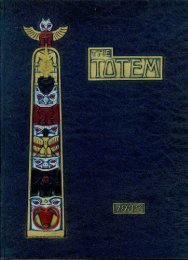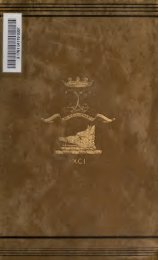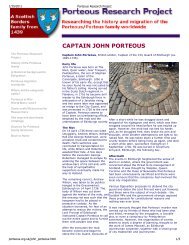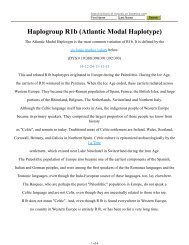The Archaeology of Britain: An introduction from ... - waughfamily.ca
The Archaeology of Britain: An introduction from ... - waughfamily.ca
The Archaeology of Britain: An introduction from ... - waughfamily.ca
You also want an ePaper? Increase the reach of your titles
YUMPU automatically turns print PDFs into web optimized ePapers that Google loves.
Middle Ages: rural settlement and manors<br />
• 249 •<br />
have resulted in the survival <strong>of</strong> waterlogged or charred timbers. In general, scientific methods<br />
have had only a limited impact on medieval archaeology in the field, although undeniably, and as<br />
with sites <strong>of</strong> all periods, they assume a much greater importance in the laboratory when finds are<br />
subject to microscopic study and analysis. Techniques that are routinely used outdoors include<br />
archaeomagnetic dating, where burnt clay features such as kilns, ovens and hearths are encountered,<br />
but rarely radio<strong>ca</strong>rbon dating be<strong>ca</strong>use the very broad date brackets do not <strong>of</strong>fer a ‘tighter’ date<br />
than that given by, say, pottery.<br />
A medieval villager lived in a lands<strong>ca</strong>pe <strong>of</strong> whose administrative complexity he was probably<br />
more aware than his modern-day equivalent. Each Sunday he would go to the church <strong>of</strong> his<br />
parish, the place where ultimately he would be buried. To that church he owed a tenth—a tithe—<br />
<strong>of</strong> all he produced on his holding, whether it be grain, hay or lambs. Once in a while, especially if<br />
doing duty as churchwarden, he might see the archdeacon, representative <strong>of</strong> the bishop and the<br />
greater Church beyond. During his life he would undoubtedly oc<strong>ca</strong>sionally become aware <strong>of</strong><br />
other systems <strong>of</strong> administration: <strong>of</strong> royal <strong>of</strong>ficials such as the county sheriff, tax collectors and<br />
travelling justices; <strong>of</strong> the county Quarter Sessions where, <strong>from</strong> the later fourteenth century, Justices<br />
<strong>of</strong> the Peace dealt with matters including murder, assault and riot; <strong>of</strong> the county coroner to<br />
whom matters including suspicious deaths and discoveries <strong>of</strong> treasure had to be reported; <strong>of</strong> the<br />
Church’s courts for those accused <strong>of</strong> moral and ecclesiasti<strong>ca</strong>l <strong>of</strong>fences; and <strong>of</strong> Forest courts, to<br />
which those who lived in the extensive areas deemed forest <strong>ca</strong>me if charged with poaching deer,<br />
damaging trees, or bringing land into cultivation without permission.<br />
<strong>The</strong> administrative unit most familiar to the villager, however, was the manor. Essentially this<br />
was the estate on which he lived and held his land. To its owner, the lord <strong>of</strong> the manor, in return<br />
for his holding he owed a money rent or labour services, that is a set number <strong>of</strong> days’ work on the<br />
lord’s own land. Although there were considerable variations both regionally and over time in the<br />
classes <strong>of</strong> peasantry and their obligations, by and large a distinction <strong>ca</strong>n be made between those<br />
who were ‘free’—that is those, usually the minority, who owed only a money rent for their holding<br />
and in whose lives the lord had relatively little opportunity to interfere—and those servile tenants<br />
who were obliged to do labour services and who, at least in theory, <strong>of</strong>ten held their farm only<br />
during their own lifetime, after which it passed back to the lord to be reallotted. In many parts <strong>of</strong><br />
the country, such men were <strong>ca</strong>lled ‘copyholders’, that is they held their house and land according<br />
to an agreement made in the manor court <strong>of</strong> which they received a written copy. Such courts,<br />
termed ‘courts baron’, were held at regular intervals, perhaps monthly, and were at the heart <strong>of</strong><br />
rural life. For here not only was the surrender and transfer <strong>of</strong> holdings dealt with but also the<br />
regulation <strong>of</strong> agricultural land and the appointment <strong>of</strong> <strong>of</strong>ficials. Those might include a hayward<br />
to look after fences and the manor’s grazing land and, most importantly, a reeve, responsible for<br />
collecting any dues owed to the lord and acting as the main channel <strong>of</strong> communi<strong>ca</strong>tions between<br />
the lord and his tenants.<br />
Parish and manor were therefore entirely separate: the first was the territory that supported a<br />
church through the payment <strong>of</strong> tithes, while the second was a lay estate comprising the land <strong>of</strong><br />
the lord and that <strong>of</strong> his tenants. Both varied greatly in size and complexity, and many parishes,<br />
especially those established earlier rather than later in the era <strong>of</strong> parish formation in the later<br />
Saxon period, contained several manors. That having been said, it was perhaps commonest for<br />
parish and manor to be co-extensive—that is to have the same boundaries—reflecting the origin<br />
<strong>of</strong> so many parish churches as the private or estate chapel <strong>of</strong> a lo<strong>ca</strong>l lord.<br />
Those frameworks, an appreciation <strong>of</strong> which is essential for the student <strong>of</strong> medieval society,<br />
have long been well understood; they survived little changed until the earlier nineteenth century<br />
and have been, and remain, the subject <strong>of</strong> intensive enquiry by historians. What then has<br />
archaeology to contribute to the study <strong>of</strong> rural settlement?







![SS Sir Francis [+1917] - waughfamily.ca](https://img.yumpu.com/49438251/1/190x245/ss-sir-francis-1917-waughfamilyca.jpg?quality=85)








